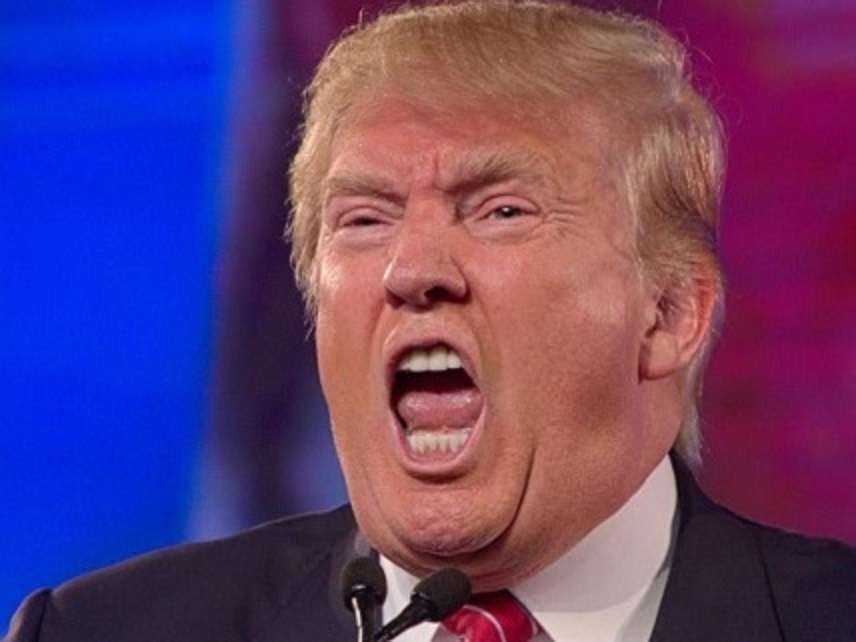The World Is Not Ending Because of Donald Trump. In Fact, It's Not Even Ending.
We will make it through the weekend, folks, but our problems will outlast the current president, alas.

By now, you know the end of the world is not simply nigh, but almost fully complete. It's all Donald Trump's fault.
Yesterday, the president announced that he's pulling 2,000 troops out of Syria, a country the U.S. should not have entered in the first place (and did so only after spending most of the 21st century destabilizing the larger Middle East). The president then hinted he was going to do the same in Afghanistan, our country's longest and perhaps least successful war. Defense Secretary James Mattis—universally anointed "the last adult in the room" around Trump—resigned, making public his unmistakable contempt for his former boss. The markets have been tanking all month, a government shutdown over a stupid and sure-to-be-ineffectual wall on the border with Mexico is looming, the weekend's big release is a movie about Aquaman, and it's raining where I live.
The nation is in "a tailspin," pronounces The Washington Post,
At perhaps the most fragile moment of his presidency—and vulnerable to convulsions on the political right—Trump single-handedly propelled the U.S. government into crisis and sent markets tumbling with his gambits this week to salvage signature campaign promises.
The president's decisions and conduct have led to a fracturing of Trump's coalition. Hawks condemned his sudden decision to withdraw U.S. troops from Syria. Conservatives called him a "gutless president" and questioned whether he would ever build a wall. Political friends began privately questioning whether Trump needed to be reined in.
A few deep breaths are in order. Yes, Trump is what Jeb Bush called him in a Republican primary debate that took place what seems like 100 years ago (actually, December 2015): a "chaos candidate" who would be a "chaos president." He's thin-skinned, too: "One of the things he's most vulnerable to is mockery and mockery by his own supporters," an anti-immigration activist told the Post.
That is nothing worth celebrating in a teenager, much less a president, but the current end-of-worldism is a bit much. Trump is doing pretty much exactly what he promised he would do: Shrink our military footprint around the world, insist on a border wall, act impulsively and childlishly. Critics are right to chastise Trump for not following any sort of coherent process in arriving at or announcing his Syria decision, but it's still the right decision. It's always ugly and disturbing when the United States pulls out of occupied countries (remember Saigon?), but are we supposed to stay in Syria and Afghanistan forever?
In this case, Trump isn't the problem. The problem is American foreign policy, which has been a virtually unmitigated disaster for the entire 21st century (and really, can we talk about Yemen at some point?). It needs a reboot, partly because our Ozymandias-like endeavors (nation-building! region-building!) were so misguided and partly because the world has changed. America can't be everywhere and shouldn't try. That recognition stings, burns, humbles perhaps even the least-interventionist folks among us. In so many places and despite our intentions, Washington has made the world a worse place, a less stable place. Power, especially military power, isn't what it used to be.
If the markets are tanking and a recession is looming, well, of course. What have we done since the Great Recession other than recreate the exact conditions that led to it? We've increased government spending and debt in a way that predictably leads to low growth, a stifling of innovation, and, eventually, a bad labor market (federal spending has been above 20 percent of GDP, a historically high level, since 2008 and shows no signs of reducing). Again, Trump isn't the cause per se of this; he's just the latest in an apostolic succession of presidents who helped to light the path. His trade wars aren't helping, for sure, but that's not the biggest problem facing us right now when it comes to long-term economic growth. Congress, which abdicated its responsibility for foreign policy a few years after the attack on Pearl Harbor, is now doing the same thing with many of its other functions (when's the last time a real budget was enacted?). Parties end, bills come due. Not a good time. The same thing is happening in other parts of the world, especially Europe.
It's easy to focus on Donald Trump, who "single-handedly" propels the government, the media, the world into crisis on an almost hourly basis. But though he is very different in the way he presents himself and is treated by the media, his actions are not so very different from those of recent presidents, all of whom crossed lines that should never have been crossed "when it came to foreign policy, domestic surveillance, governmental overreach, the drug war, deportations, and so much more." What Trump ultimately represents or embodies is the twilight of postwar America, of a consensus forged for a very different world and very different circumstances. He too will pass from the scene, and then many, if not all, of the same problems will remain—until we reach a new consensus for a government that no longer tries to be all things to all people, both here and abroad.


Show Comments (161)